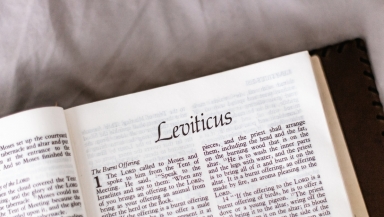
Hebrew scholar and Jewish academic Irene Lancaster reflects on Leviticus, holiness and loving your neighbor.
The Book of Leviticus often conjures images of strict laws and regulations, a text many might consider outdated. Yet, Rabbi Nathan Cardozo’s latest work offers a fresh perspective that blends traditional teachings with contemporary relevance. As the founder and dean of the David Cardozo Academy in Jerusalem, Rabbi Cardozo is renowned for his deep insights into Jewish thought, having authored numerous books and articles that engage both Jewish and non-Jewish audiences.
Rabbi Cardozo’s influence extends beyond academic circles. Rabbi Jonathan Sacks once described him as “one of the most thoughtful voices in contemporary Judaism,” and his ideas were highlighted at the Annual Jonathan Sacks Memorial Lecture by former Archbishop of Canterbury, Lord Rowan Williams.
The backdrop for Rabbi Cardozo’s latest book, The Book of Leviticus, is as compelling as its content. Written during the conflicts faced by Israel, parts of the book were penned in a bunker, adding a layer of urgency and introspection.
The readings from Leviticus, particularly chapters 16-20, are explored through Rabbi Cardozo’s lens, focusing on holiness and love. In Leviticus 19:2, the instruction is clear: “Speak to the entire congregation of the children of Israel and say to them: ‘You shall be holy, for I the Lord your G-d am holy.'” This passage raises an essential question about the nature of holiness—whether it is inherent or achieved through action.
This debate is not new. Maimonides, a towering figure in Jewish thought, emphasized that holiness is linked to righteous living rather than a birthright. Professor Menachem Kellner of Haifa University supports this view, advocating for continuous spiritual effort.
Rabbi Cardozo connects this to the Haftorah reading from Amos 9:7-15, which challenges the notion of Jewish uniqueness in the Exodus narrative. Amos questions the complacency of assuming holiness without ongoing effort.
The second key passage, Leviticus 19:18, is widely known beyond Jewish circles: “You shall love your neighbor as yourself. I am the Lord.” This principle was recently debated between US Vice President JD Vance and podcaster Rory Stewart, highlighting differing views on universal love versus practical application.
Rabbi Akiva, a revered Jewish scholar, deemed this the greatest Torah principle, advocating for self-preservation first to enable genuine care for others. His advice is mirrored in emergency protocols, such as those on airlines, where self-care ensures the ability to assist others.
Jewish scholars like Maimonides, who also practiced medicine, preferred pragmatic approaches over theoretical ones, emphasizing practical wisdom in daily life.
In exploring Rabbi Cardozo’s interpretations of Leviticus, these discussions on holiness and love invite reflection on their broader implications. Holiness, as seen by the Jewish community, requires diligent spiritual work, while love starts from self-care and extends outward to the global community.
Rabbi Cardozo’s analysis offers valuable insights into these timeless teachings, encouraging readers to reconsider Leviticus in a modern context.
This article was originally written by www.christiantoday.com







Be First to Comment